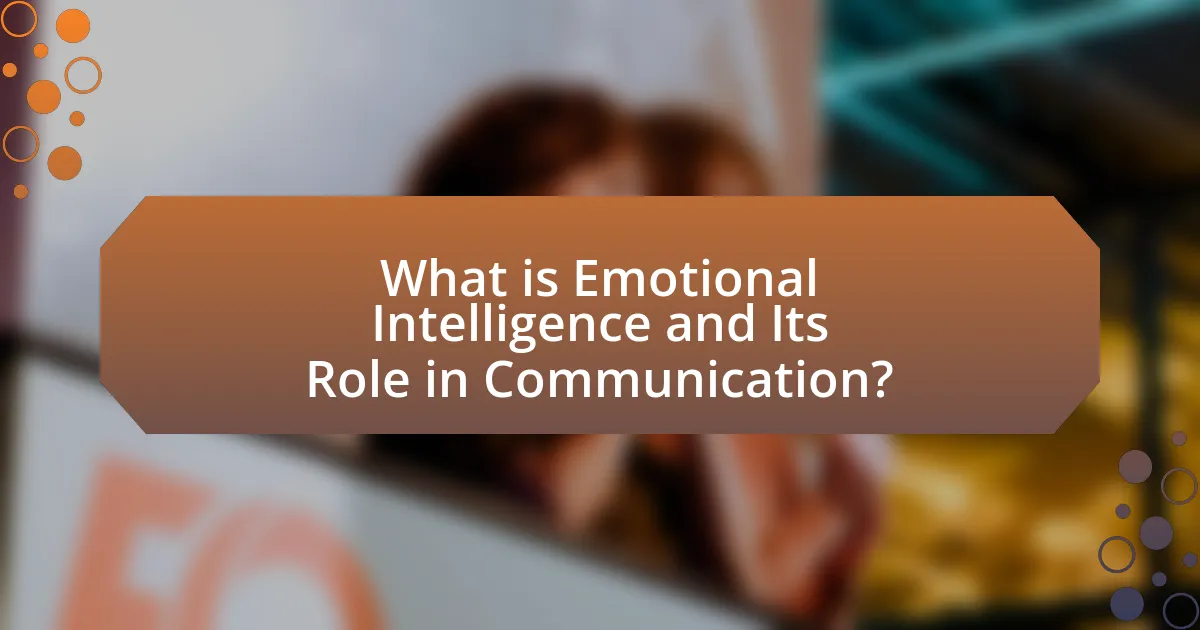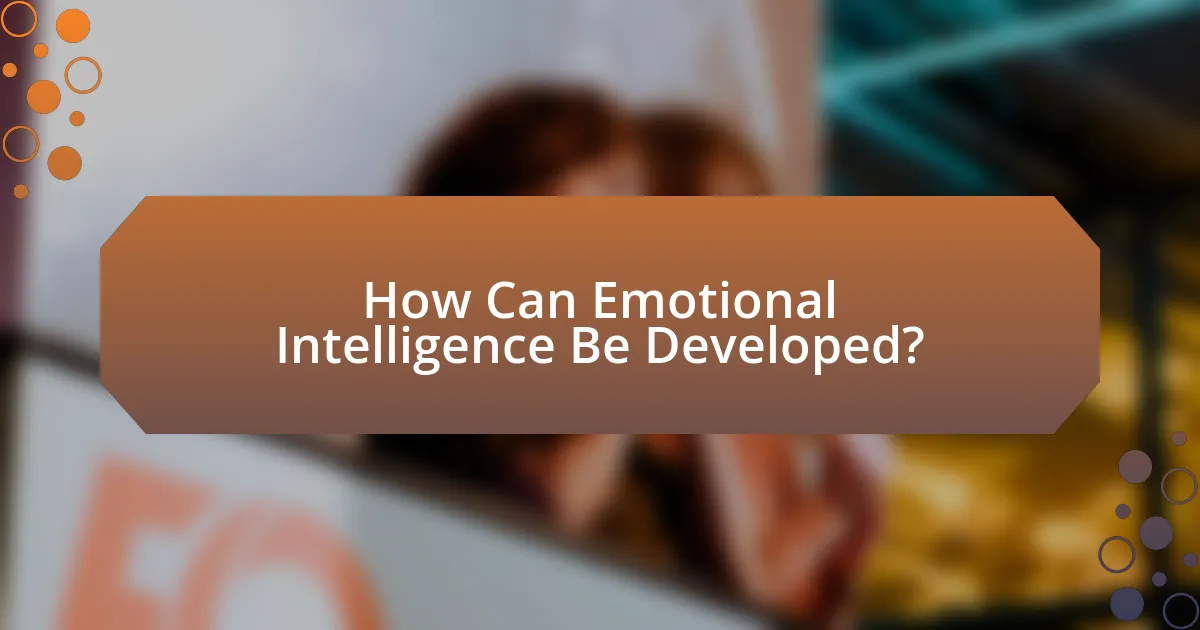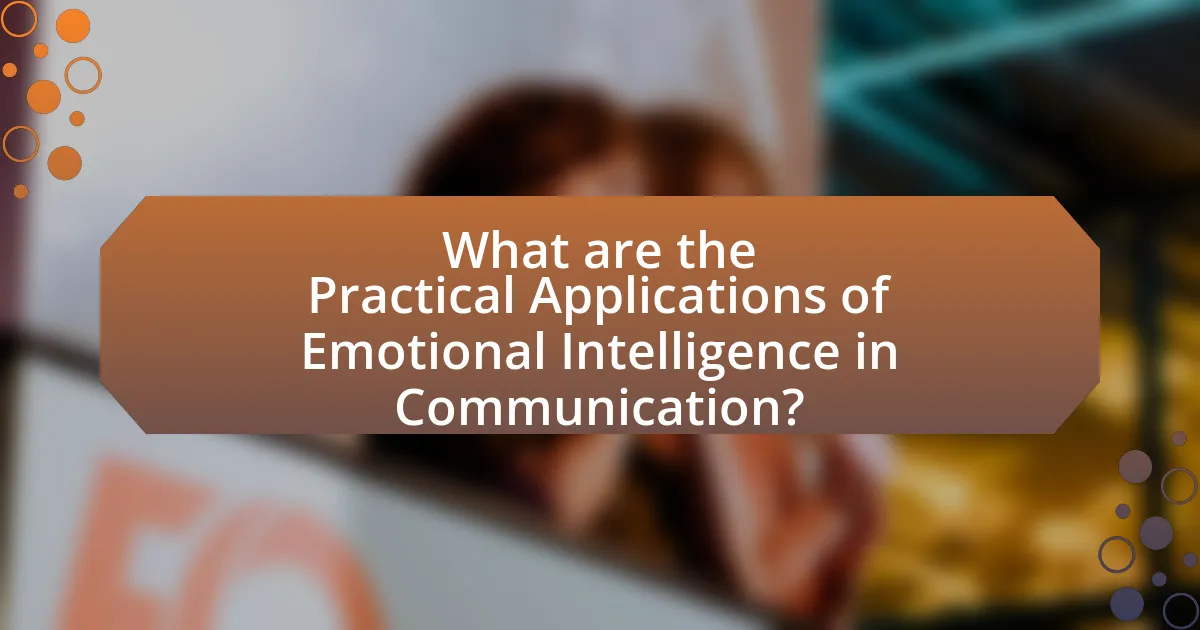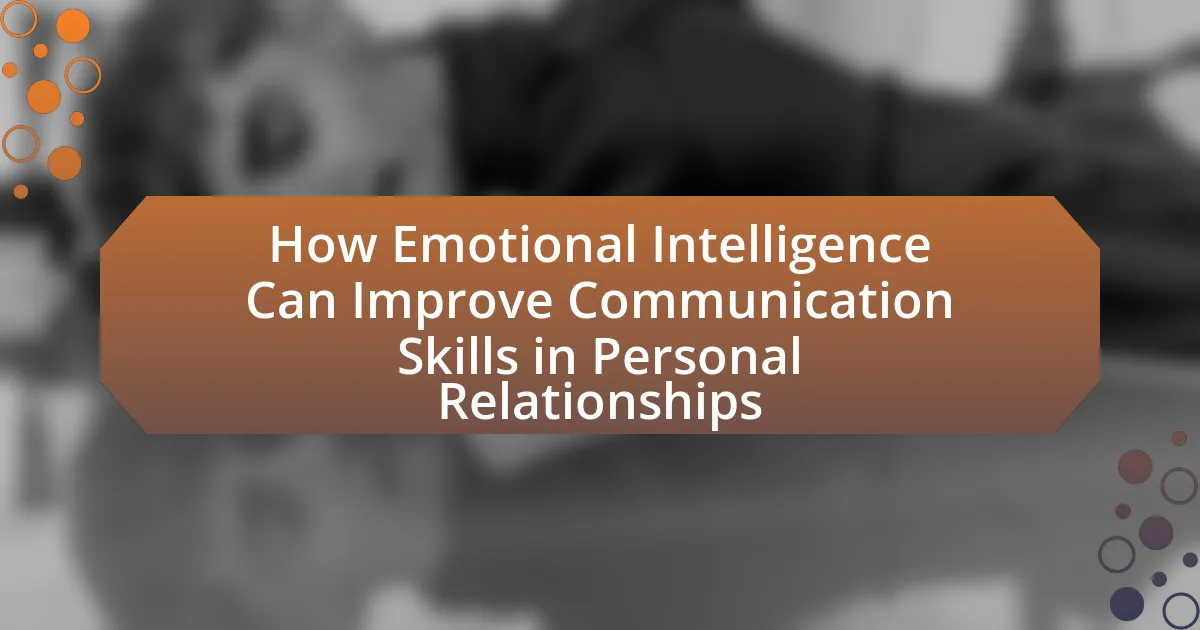Emotional intelligence is defined as the ability to recognize, understand, and manage one’s own emotions while also influencing the emotions of others. This article explores how emotional intelligence enhances communication skills in personal relationships by fostering empathy, improving conflict resolution, and facilitating effective feedback. Key components of emotional intelligence, such as self-awareness, self-regulation, motivation, empathy, and social skills, are examined for their roles in enhancing interpersonal interactions. Additionally, the article discusses practical applications, challenges, and strategies for developing emotional intelligence to improve communication effectiveness and relationship satisfaction.

What is Emotional Intelligence and Its Role in Communication?
Emotional intelligence is the ability to recognize, understand, and manage one’s own emotions while also being able to recognize, understand, and influence the emotions of others. This skill plays a crucial role in communication by enhancing interpersonal interactions, fostering empathy, and improving conflict resolution. Research indicates that individuals with high emotional intelligence are better at interpreting non-verbal cues and responding appropriately, which leads to more effective and meaningful conversations. For instance, a study published in the Journal of Applied Psychology found that emotional intelligence significantly correlates with communication effectiveness, demonstrating that those who can manage their emotions and empathize with others are more successful in personal relationships.
How does Emotional Intelligence influence personal relationships?
Emotional Intelligence significantly influences personal relationships by enhancing communication, empathy, and conflict resolution. Individuals with high Emotional Intelligence can better understand their own emotions and those of others, leading to more effective interactions. Research indicates that people with strong Emotional Intelligence skills are more adept at expressing their feelings and responding to the emotions of others, which fosters deeper connections and trust. For instance, a study published in the Journal of Personality and Social Psychology found that individuals with higher Emotional Intelligence reported greater relationship satisfaction and were more successful in resolving conflicts amicably. This ability to navigate emotional landscapes ultimately strengthens personal relationships.
What are the key components of Emotional Intelligence?
The key components of Emotional Intelligence are self-awareness, self-regulation, motivation, empathy, and social skills. Self-awareness involves recognizing one’s emotions and their impact on thoughts and behavior. Self-regulation refers to managing emotions and impulses effectively. Motivation encompasses the drive to pursue goals with energy and persistence. Empathy is the ability to understand and share the feelings of others, which enhances interpersonal relationships. Social skills involve the ability to build and maintain healthy relationships through effective communication and conflict resolution. These components collectively contribute to improved communication skills in personal relationships, as they enable individuals to navigate emotional dynamics and foster deeper connections.
How do these components enhance communication skills?
Emotional intelligence components, such as self-awareness, empathy, and emotional regulation, enhance communication skills by enabling individuals to understand and manage their own emotions while effectively interpreting the emotions of others. Self-awareness allows individuals to recognize their emotional triggers, leading to clearer and more thoughtful communication. Empathy fosters deeper connections by helping individuals respond appropriately to the feelings of others, which can reduce misunderstandings and conflicts. Emotional regulation equips individuals with the ability to control their emotional responses, promoting calm and constructive dialogue even in challenging situations. Research by Goleman (1995) in “Emotional Intelligence” supports this, demonstrating that higher emotional intelligence correlates with improved interpersonal communication and relationship satisfaction.
Why is Emotional Intelligence important for effective communication?
Emotional Intelligence is crucial for effective communication because it enables individuals to understand and manage their own emotions while also recognizing and influencing the emotions of others. This understanding fosters empathy, which is essential for building rapport and trust in personal relationships. Research indicates that high emotional intelligence correlates with better communication skills, as individuals with this trait are more adept at interpreting non-verbal cues and responding appropriately to emotional contexts. For instance, a study published in the Journal of Personality and Social Psychology found that individuals with higher emotional intelligence are more successful in resolving conflicts and maintaining positive interactions, highlighting its significance in enhancing communication effectiveness.
What are the consequences of low Emotional Intelligence in relationships?
Low Emotional Intelligence in relationships leads to poor communication, increased conflict, and emotional disconnection. Individuals with low Emotional Intelligence struggle to recognize and manage their own emotions, which can result in misunderstandings and misinterpretations of their partner’s feelings. Research indicates that couples with low Emotional Intelligence experience higher levels of dissatisfaction and are more likely to engage in negative communication patterns, such as criticism and defensiveness. This lack of emotional awareness can hinder conflict resolution, making it difficult for partners to empathize with each other, ultimately weakening the relationship’s foundation.
How can high Emotional Intelligence improve conflict resolution?
High Emotional Intelligence (EI) enhances conflict resolution by enabling individuals to understand and manage their own emotions while empathizing with others. This understanding fosters effective communication, allowing parties to express their feelings and perspectives clearly, which is crucial during conflicts. Research indicates that individuals with high EI are better at recognizing emotional cues, leading to more constructive dialogues and reduced escalation of disputes. For instance, a study published in the Journal of Organizational Behavior found that teams with members exhibiting high EI demonstrated improved collaboration and conflict management skills, resulting in more effective resolutions.

How Can Emotional Intelligence Be Developed?
Emotional intelligence can be developed through self-awareness, practice, and feedback. Individuals can enhance their emotional intelligence by engaging in reflective practices, such as journaling or mindfulness, which help them recognize their emotions and triggers. Additionally, participating in social interactions and seeking constructive feedback from peers can improve interpersonal skills and empathy. Research indicates that training programs focused on emotional intelligence, such as those developed by the Consortium for Research on Emotional Intelligence in Organizations, have shown significant improvements in participants’ emotional competencies, leading to better communication and relationship outcomes.
What strategies can enhance Emotional Intelligence?
Practicing self-awareness, empathy, and active listening are effective strategies to enhance Emotional Intelligence. Self-awareness involves recognizing one’s emotions and their impact on thoughts and behavior, which can be developed through mindfulness practices and reflective journaling. Empathy, the ability to understand and share the feelings of others, can be improved by engaging in perspective-taking exercises and fostering open communication. Active listening, which requires fully concentrating on the speaker, can be enhanced by minimizing distractions and providing feedback, thereby improving interpersonal interactions. Research indicates that individuals with higher Emotional Intelligence tend to have better communication skills, leading to more fulfilling personal relationships.
How does self-awareness contribute to better communication?
Self-awareness enhances communication by enabling individuals to understand their own emotions, thoughts, and behaviors, which in turn allows for clearer expression and interpretation of messages. When a person is self-aware, they can recognize how their feelings influence their communication style, leading to more thoughtful and intentional interactions. Research indicates that self-aware individuals are better at managing their emotional responses, which reduces misunderstandings and conflicts in conversations. For instance, a study published in the Journal of Personality and Social Psychology found that self-awareness is linked to improved interpersonal relationships, as it fosters empathy and active listening, essential components of effective communication.
What role does empathy play in improving communication skills?
Empathy significantly enhances communication skills by fostering understanding and connection between individuals. When a person demonstrates empathy, they are better able to interpret the emotions and perspectives of others, which leads to more effective and meaningful exchanges. Research indicates that empathetic communication can reduce misunderstandings and conflicts, as it encourages active listening and validation of feelings. For instance, a study published in the Journal of Personality and Social Psychology found that individuals who practiced empathy were more successful in resolving interpersonal conflicts, highlighting its critical role in facilitating clear and constructive dialogue.
How can mindfulness practices support Emotional Intelligence growth?
Mindfulness practices enhance Emotional Intelligence by fostering self-awareness and emotional regulation. Engaging in mindfulness techniques, such as meditation and focused breathing, allows individuals to observe their thoughts and feelings without judgment, leading to a deeper understanding of their emotional responses. Research indicates that mindfulness can increase emotional awareness, as demonstrated in a study published in the journal “Emotion” by Brown, Ryan, and Creswell, which found that mindfulness training significantly improved participants’ ability to recognize and manage their emotions. This heightened emotional awareness is crucial for developing empathy and improving interpersonal communication, essential components of Emotional Intelligence.
What techniques can be used to practice mindfulness in communication?
Techniques to practice mindfulness in communication include active listening, maintaining eye contact, and being aware of non-verbal cues. Active listening involves fully concentrating on the speaker, which enhances understanding and empathy, essential components of emotional intelligence. Maintaining eye contact fosters connection and shows engagement, while being aware of non-verbal cues helps in interpreting the emotional context of the conversation. Research indicates that these techniques can significantly improve interpersonal relationships by promoting clarity and reducing misunderstandings, thereby enhancing overall communication effectiveness.
How does mindfulness affect emotional regulation in conversations?
Mindfulness enhances emotional regulation in conversations by promoting awareness of one’s thoughts and feelings, allowing individuals to respond rather than react impulsively. This heightened awareness enables better management of emotional responses, leading to more constructive interactions. Research indicates that mindfulness practices can reduce emotional reactivity and increase empathy, which are crucial for effective communication. A study published in the Journal of Happiness Studies by Brown and Ryan (2003) found that individuals who practice mindfulness report higher levels of emotional regulation and interpersonal effectiveness, supporting the assertion that mindfulness positively influences emotional dynamics in conversations.

What are the Practical Applications of Emotional Intelligence in Communication?
The practical applications of emotional intelligence in communication include enhanced empathy, improved conflict resolution, and effective feedback delivery. Emotional intelligence enables individuals to recognize and understand their own emotions and those of others, facilitating deeper connections and more meaningful conversations. For instance, research by Goleman (1995) highlights that individuals with high emotional intelligence can better navigate social complexities, leading to more productive interactions. Furthermore, a study published in the Journal of Applied Psychology found that teams with emotionally intelligent members experience higher collaboration and lower conflict, demonstrating the tangible benefits of emotional intelligence in communication settings.
How can Emotional Intelligence improve listening skills?
Emotional Intelligence enhances listening skills by enabling individuals to better understand and respond to the emotions of others. This heightened awareness allows listeners to engage more fully, demonstrating empathy and validating the speaker’s feelings. Research indicates that individuals with high Emotional Intelligence are more adept at interpreting non-verbal cues, which significantly contributes to effective listening. For instance, a study published in the Journal of Applied Psychology found that leaders with higher Emotional Intelligence scores were perceived as better listeners, fostering stronger interpersonal relationships. This ability to connect emotionally not only improves comprehension but also encourages open dialogue, ultimately strengthening personal relationships.
What techniques can enhance active listening through Emotional Intelligence?
Techniques that can enhance active listening through Emotional Intelligence include practicing empathy, maintaining eye contact, and providing feedback. Empathy allows individuals to understand and share the feelings of others, which fosters a deeper connection during conversations. Maintaining eye contact demonstrates attentiveness and respect, signaling to the speaker that their message is valued. Providing feedback, such as summarizing or paraphrasing what the speaker has said, confirms understanding and encourages further dialogue. Research indicates that these techniques significantly improve interpersonal communication, as they create a supportive environment that promotes openness and trust.
How does understanding non-verbal cues relate to Emotional Intelligence?
Understanding non-verbal cues is a critical component of Emotional Intelligence, as it enhances an individual’s ability to perceive and interpret emotions in themselves and others. Non-verbal cues, such as facial expressions, body language, and tone of voice, provide essential context that complements verbal communication, allowing for a deeper understanding of emotional states. Research indicates that individuals with high Emotional Intelligence are more adept at recognizing these cues, which facilitates better interpersonal interactions and conflict resolution. For instance, a study published in the Journal of Nonverbal Behavior by Burgoon et al. (2016) found that effective interpretation of non-verbal signals significantly correlates with improved relational outcomes, highlighting the importance of non-verbal communication in fostering emotional connections.
What are some common challenges in applying Emotional Intelligence to communication?
Common challenges in applying Emotional Intelligence to communication include difficulty in self-regulation, misinterpretation of emotional cues, and resistance to vulnerability. Self-regulation can hinder effective communication when individuals struggle to manage their emotions, leading to reactive responses rather than thoughtful dialogue. Misinterpretation of emotional cues occurs when individuals fail to accurately read the emotions of others, which can result in misunderstandings and conflict. Additionally, resistance to vulnerability can prevent open and honest communication, as individuals may fear judgment or rejection, thus limiting the depth of their interactions. These challenges can significantly impact the quality of personal relationships, as effective communication relies on the ability to understand and manage emotions.
How can individuals overcome barriers to effective communication?
Individuals can overcome barriers to effective communication by developing emotional intelligence, which enhances their ability to understand and manage their own emotions as well as those of others. Emotional intelligence facilitates active listening, empathy, and clarity in expressing thoughts, thereby reducing misunderstandings. Research by Goleman (1995) highlights that individuals with high emotional intelligence are better equipped to navigate social complexities and communicate effectively, leading to improved personal relationships. By practicing self-awareness and emotional regulation, individuals can create a more open and constructive communication environment.
What role does feedback play in improving communication skills?
Feedback is essential for improving communication skills as it provides individuals with specific insights into their strengths and weaknesses. By receiving constructive criticism, individuals can identify areas for enhancement, such as clarity, tone, and body language. Research indicates that feedback fosters self-awareness, a key component of emotional intelligence, which in turn enhances interpersonal communication. For instance, a study published in the Journal of Applied Psychology found that individuals who actively seek and apply feedback demonstrate significant improvements in their communication effectiveness, leading to better personal relationships.
What are some best practices for enhancing communication skills through Emotional Intelligence?
Best practices for enhancing communication skills through Emotional Intelligence include active listening, empathy, and self-regulation. Active listening involves fully concentrating on the speaker, which fosters understanding and connection. Empathy allows individuals to recognize and validate the emotions of others, leading to more meaningful interactions. Self-regulation helps manage one’s own emotional responses, ensuring that communication remains constructive and respectful. Research by Goleman (1995) in “Emotional Intelligence” highlights that these practices significantly improve interpersonal relationships by promoting clarity and reducing misunderstandings.
